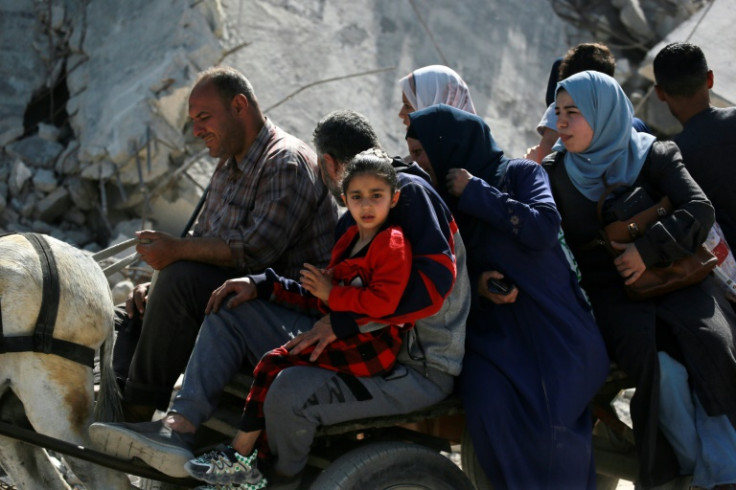
The UK this week failed to join nine European countries that called for reforms to the European Convention on Human Rights (ECHR), despite Attorney-General Lord Hermer recently urging Britain to take the lead in updating international legal frameworks that affect immigration.
In a joint open letter, Austria, Belgium, the Czech Republic, Denmark, Estonia, Italy, Latvia, Lithuania and Poland urged the 46 member states of the ECHR to support reforms that would 'restore the right balance' between protecting human rights and allowing countries to manage immigration and national security more effectively.
But Britain was not among the signatories, even as migrant arrivals across the Channel hit a new record. On Saturday alone, 1,195 people arrived in small boats, marking the highest single-day total so far in 2025, according to the Home Office.
The UK government said it had not been invited to join the initiative, which may have emerged from discussions in an EU forum, despite the ECHR being governed by the Council of Europe, not the European Union.
The government's position contrasts with comments made just a week earlier by Attorney-General Lord Hermer, who said the UK 'must be ready to reform' international agreements such as the ECHR to preserve the rules-based order.
Shadow Lord Chancellor Robert Jenrick criticised Hermer's remarks, calling them 'a cynical ploy to give the impression Labour want to be part of the solution, when really they're helping to defend a broken system that stops us controlling our borders.'
Human rights lawyer David Haye echoed the calls for tougher action, urging Britain to either 'reform or leave' the ECHR, arguing that the country 'cannot regain control of its borders' under the current system.
Divergence
The ECHR dispute reflects broader differences between the UK and EU legal systems, particularly in areas such as human rights and sanctions. Since Brexit, the UK has introduced its own independent sanctions regime, though it often mirrors the EU's initial listings.
'Our preference is to act with others where we can, but where there is a case for the UK to act alone via the use of our autonomous sanctions, we will do so,' the UK government stated in its policy paper, 'Cross-government review of sanctions implementation and enforcement,' published on 15 May.
This divergence creates increasing compliance challenges for businesses. Even if an individual is removed from the EU sanctions list, businesses may still face penalties if that person remains sanctioned in the UK, causing confusion, driving up legal costs and complicating cross-border operations.
The same issue affects individuals. Some have been delisted by the EU after legal reviews found sanctions were no longer justified, yet they remain on the UK list due to the absence of a formal review mechanism. For example, former Russian official Dmitrii Ovsiannikov was removed from the EU list in 2023 but is still sanctioned by the UK. In April 2025, he was sentenced to 40 months in prison for attempting to leave the UK on a private jet in breach of sanctions.
Another notable example is the case of Gulbakhor Ismailova and Saodat Narzieva, sisters of sanctioned businessman Alisher Usmanov. Both successfully challenged their EU sanctions after legal reviews concluded the measures were based on false media reports. Although the EU delisted them in 2022 and 2025 respectively, and both were initially designated in the UK under the so-called 'emergency procedure,' which mirrored the EU's reasoning, they remain on the UK sanctions list, which lacks a formal process for regular review.
A similar pattern can be seen in the case of Mikhail Degtyarev, a longtime loyalist of Russian President Vladimir Putin. As the country's sports minister and head of the Olympic Committee, Degtyarev is the highest-ranking Russian official to have been removed from the EU sanctions list. Despite this, he remains sanctioned in the UK.
Commitment To Revision
While each sanctions case is handled on an individual basis and countries follow their own legal procedures, the lack of alignment in how human rights are considered or how companies need to comply with the sanctions regime create friction in coordinated responses. In particular, indefinite UK sanctions imposed without clear procedures for review or appeal raise questions about proportionality and the absence of effective judicial mechanisms.
But given that the current sanctions mechanism is relatively new, it would be reasonable to expect it to evolve in response to changing realities, especially as the UK has acknowledged its commitment to revision when necessary.
'Sanctions are often developed in response to real-time events, and in concert with allies, or the wider international community. We keep our sanctions powers, regimes, designations and measures under review to respond to new developments and changing circumstances,' the UK government's 15 May policy paper said.
Originally published on IBTimes UK







